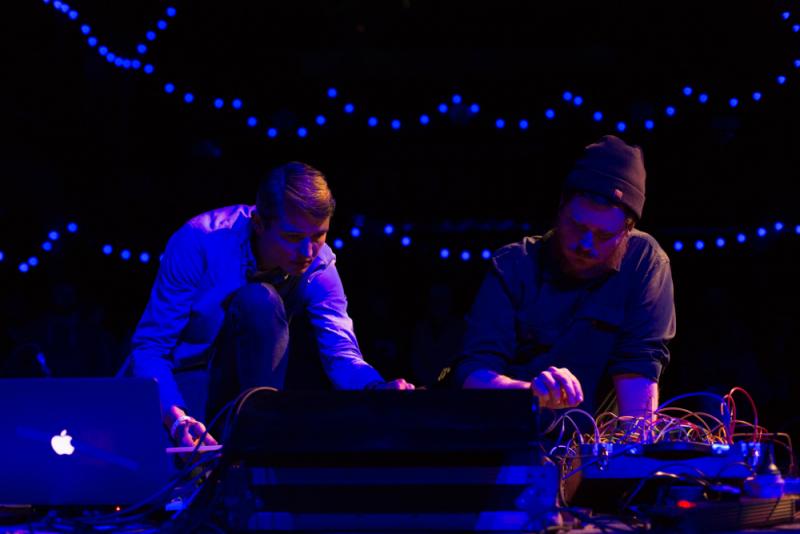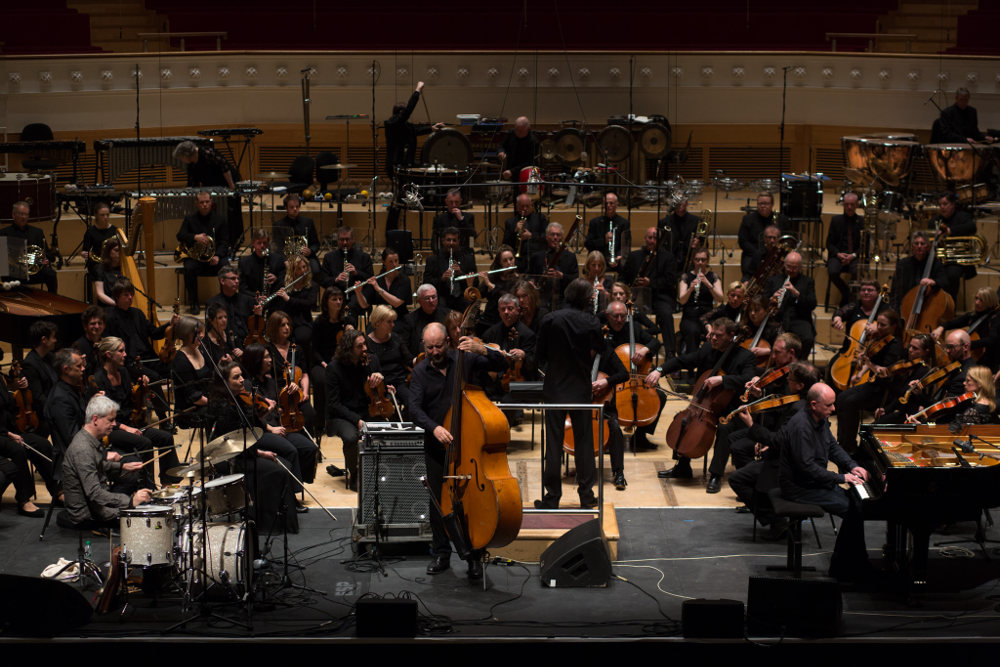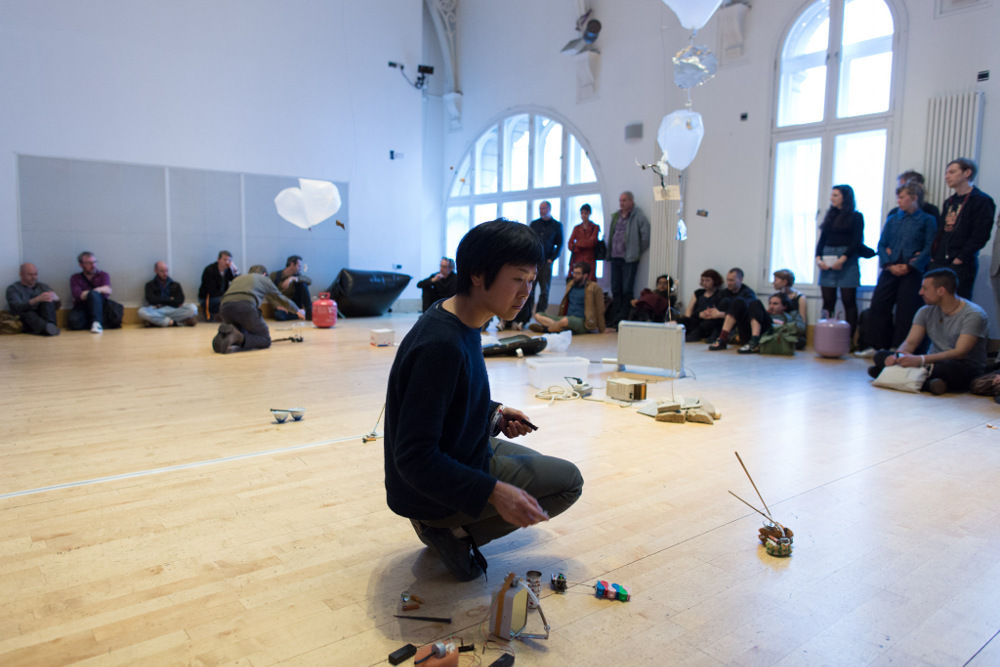theartsdesk at Tectonics Glasgow 2017 | reviews, news & interviews
theartsdesk at Tectonics Glasgow 2017
theartsdesk at Tectonics Glasgow 2017
A new-found restraint replaced the festival's infamous flamboyant excess

Has Glasgow’s Tectonics weekend turned away from its wilder excess? Has it, in its fifth outing, even – well, grown up and got serious?
Take the afternoon’s chamber concert from US piano and percussion quartet Yarn/Wire, for example. Andrew McIntosh’s Hyenas in the Temples of Pleasure (receiving its European premiere) was about as far from the excess that that title suggests as it’s possible to be – a restrained, understated, three-movement work where Nancarrow-like piano patterning gave way to gentle clicks from woodblocks, or infinitessimal pitch changes from a ceramic bowl gradually being filled with water. The accompanying piece, Thomas Meadowcroft’s Walkman Antiquarian, was livelier, pitching chopped-up samples from the record collection of the composer’s father against skittering drumbeats and a languid jazz piano, but there was still a mood of melancholy, even nostalgia, behind the whole thing.
 Or take the Saturday evening concert from the BBC Scottish Symphony Orchestra, on reliably adroit form across a demanding quartet of pieces. The 1977 Kassandra by François-Bernard Mâche was a gentle dialogue between taped nature sounds – thunderstorms, hailstones, buzzing insects and chattering voices – and an ensemble that transformed those sounds into musical gestures, all carried off very persuasively. There were more suggestions of the natural world in Wilderness (another European premiere) by New York-born, Toronto-based Linda Catlin Smith, one of the weekend’s featured composers. It was a sensuous, expansive work of quiet grandeur, a seemingly endless violin melody – delivered with poise by BBC SSO leader Laura Samuel – supported by opulent stacks of harmony from the orchestra. Alongside an introspective new work for cello and orchestra by Lori Goldston, with the composer as soloist, Catlin Smith’s evocative piece invited contemplation, or immersion within its slowly developing ideas, to truly experience the restrained riches it had to offer.
Or take the Saturday evening concert from the BBC Scottish Symphony Orchestra, on reliably adroit form across a demanding quartet of pieces. The 1977 Kassandra by François-Bernard Mâche was a gentle dialogue between taped nature sounds – thunderstorms, hailstones, buzzing insects and chattering voices – and an ensemble that transformed those sounds into musical gestures, all carried off very persuasively. There were more suggestions of the natural world in Wilderness (another European premiere) by New York-born, Toronto-based Linda Catlin Smith, one of the weekend’s featured composers. It was a sensuous, expansive work of quiet grandeur, a seemingly endless violin melody – delivered with poise by BBC SSO leader Laura Samuel – supported by opulent stacks of harmony from the orchestra. Alongside an introspective new work for cello and orchestra by Lori Goldston, with the composer as soloist, Catlin Smith’s evocative piece invited contemplation, or immersion within its slowly developing ideas, to truly experience the restrained riches it had to offer.
Taking that idea even further was the BBC SSO’s improvised collaboration with Australian minimalist jazz trio the Necks (pictured above), which turned tiny cells of ideas over and over, slowly building majestic textures – kind of like Steve Reich meets Sigur Rós. The result was a slowly changing, monolithic wall of sound, across about an hour, which felt deeply satisfying on several levels: as a piece of music, as a process in action, and as an exercise in orchestra-wide improvisation, led by an alert Volkov on the podium, responding to the trio’s musical gestures.
Even the afternoon’s rather wilder opening concert in Old Fruitmarket invited contemplation – with ecstatic, circular-breathing solos from US jazz saxophonist Roscoe Mitchell, and an ear-bending, all-consuming electronic soundscape created and manipulated by John Chantler and Luke Fowler (main picture).
 But the piece – if you can call it a piece – that really seemed to epitomise Tectonics’ new introspection was an installation by artists Pierre Berthet and Rie Nakajima (pictured above). Set apart in City Halls’s intimate recital room, and with entrance understandably limited to a few people at a time, it was a menagerie of whirring, clicking, pulsating mini-machines, inflated pedal bin-liners held aloft by the warm air from electric radiators, massive inflated black bin liners seeming to breathe and purr as air entered and escaped them. It was homespun and kooky, certainly, but poignantly beautiful, too, in its fragility and delicacy. And it served as a touching symbol for the festival’s new-found restraint – without losing any of its desire to prod and provoke.
But the piece – if you can call it a piece – that really seemed to epitomise Tectonics’ new introspection was an installation by artists Pierre Berthet and Rie Nakajima (pictured above). Set apart in City Halls’s intimate recital room, and with entrance understandably limited to a few people at a time, it was a menagerie of whirring, clicking, pulsating mini-machines, inflated pedal bin-liners held aloft by the warm air from electric radiators, massive inflated black bin liners seeming to breathe and purr as air entered and escaped them. It was homespun and kooky, certainly, but poignantly beautiful, too, in its fragility and delicacy. And it served as a touching symbol for the festival’s new-found restraint – without losing any of its desire to prod and provoke.
rating
Share this article
The future of Arts Journalism
You can stop theartsdesk.com closing!
We urgently need financing to survive. Our fundraising drive has thus far raised £49,000 but we need to reach £100,000 or we will be forced to close. Please contribute here: https://gofund.me/c3f6033d
And if you can forward this information to anyone who might assist, we’d be grateful.

Subscribe to theartsdesk.com
Thank you for continuing to read our work on theartsdesk.com. For unlimited access to every article in its entirety, including our archive of more than 15,000 pieces, we're asking for £5 per month or £40 per year. We feel it's a very good deal, and hope you do too.
To take a subscription now simply click here.
And if you're looking for that extra gift for a friend or family member, why not treat them to a theartsdesk.com gift subscription?
more Classical music
 Echo Vocal Ensemble, Latto, Union Chapel review - eclectic choral programme garlanded with dance
Beautiful singing at the heart of an imaginative and stylistically varied concert
Echo Vocal Ensemble, Latto, Union Chapel review - eclectic choral programme garlanded with dance
Beautiful singing at the heart of an imaginative and stylistically varied concert
 Scott, Irish Baroque Orchestra, Whelan, RIAM, Dublin review - towards a Mozart masterpiece
Characteristic joy and enlightenment from this team, but a valveless horn brings problems
Scott, Irish Baroque Orchestra, Whelan, RIAM, Dublin review - towards a Mozart masterpiece
Characteristic joy and enlightenment from this team, but a valveless horn brings problems
 Classical CDs: Voice flutes, flugelhorns and froth
Baroque sonatas, English orchestral music and an emotionally-charged vocal recital
Classical CDs: Voice flutes, flugelhorns and froth
Baroque sonatas, English orchestral music and an emotionally-charged vocal recital
 Kanneh-Mason, Britten Sinfonia, Shave, Milton Court - a grin and a big beaming smile
A pair of striking contemporary pieces alongside two old favourites
Kanneh-Mason, Britten Sinfonia, Shave, Milton Court - a grin and a big beaming smile
A pair of striking contemporary pieces alongside two old favourites
 theartsdesk at the New Ross Piano Festival - Finghin Collins’ musical rainbow
From revelatory Bach played with astounding maturity by a 22 year old to four-hand jazz
theartsdesk at the New Ross Piano Festival - Finghin Collins’ musical rainbow
From revelatory Bach played with astounding maturity by a 22 year old to four-hand jazz
 First Person: Manchester Camerata's Head of Artistic Planning Clara Marshall Cawley on questioning the status quo
Five days of free events with all sorts of audiences around Manchester starts tomorrow
First Person: Manchester Camerata's Head of Artistic Planning Clara Marshall Cawley on questioning the status quo
Five days of free events with all sorts of audiences around Manchester starts tomorrow
 Goldscheider, Brother Tree Sound, Kings Place review - music of hope from a young composer
Unusual combination of horn, strings and electronics makes for some intriguing listening
Goldscheider, Brother Tree Sound, Kings Place review - music of hope from a young composer
Unusual combination of horn, strings and electronics makes for some intriguing listening
 theartsdesk Q&A: composer Donghoon Shin on his new concerto for pianist Seong-Jin Cho
Classical music makes its debut at London's K-Music Festival
theartsdesk Q&A: composer Donghoon Shin on his new concerto for pianist Seong-Jin Cho
Classical music makes its debut at London's K-Music Festival
 Helleur-Simcock, Hallé, Wong, Bridgewater Hall, Manchester review - moving lyricism in Elgar’s concerto
Season opener brings lyrical beauty, crisp confidence and a proper Romantic wallow
Helleur-Simcock, Hallé, Wong, Bridgewater Hall, Manchester review - moving lyricism in Elgar’s concerto
Season opener brings lyrical beauty, crisp confidence and a proper Romantic wallow
 Kohout, Spence, Braun, Manchester Camerata, Huth, RNCM, Manchester review - joy, insight, imagination and unanimity
Celebration of the past with stars of the future at the Royal Northern College
Kohout, Spence, Braun, Manchester Camerata, Huth, RNCM, Manchester review - joy, insight, imagination and unanimity
Celebration of the past with stars of the future at the Royal Northern College

Add comment